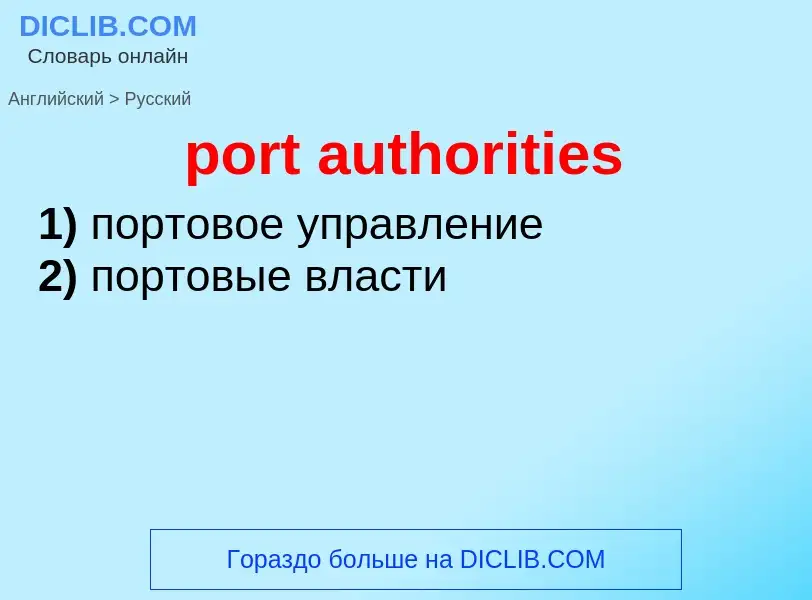Перевод и анализ слов искусственным интеллектом ChatGPT
На этой странице Вы можете получить подробный анализ слова или словосочетания, произведенный с помощью лучшей на сегодняшний день технологии искусственного интеллекта:
- как употребляется слово
- частота употребления
- используется оно чаще в устной или письменной речи
- варианты перевода слова
- примеры употребления (несколько фраз с переводом)
- этимология
port authorities - перевод на русский
['hɑ:bəmɑ:stə]
существительное
общая лексика
начальник
капитан порта
портовый инспектор
начальник, капитан порта
[,pɔ:təv,lʌndənɔ:'θɔrɪtɪ]
общая лексика
Управление лондонского порта (в его состав входят представители судовладельцев, импортно-экспортных компаний и организаций, местных властей и профсоюзов)
['pɔ:t'hju(ə)rən]
география
г. Порт-Гурон
Определение
Википедия
In Canada and the United States, a port authority (less commonly a port district) is a governmental or quasi-governmental public authority for a special-purpose district usually formed by a legislative body (or bodies) to operate ports and other transportation infrastructure. In Canada, the federal Minister of Transport selects the local chief executive board member and the rest of the board is appointed at the recommendation of port users to the federal Minister; while all Canadian port authorities have a federal or Crown charter called letters patent.
Numerous Caribbean nations have port authorities, including those of Aruba, British Virgin Islands, Bahamas, Jamaica, Cayman Islands, Trinidad and Tobago, St. Lucia, St. Maarten, St. Vincent and the Grenadines.
Central and South America also have port agencies such as autoridad and consorcio (authority and consortium).
In Mexico, the federal government created sixteen port administrations in 1994–1995 called Administración Portuaria Integral (Integral Port Administration) in Spanish, as result of the Ley de Puertos (Port Law) of 1993. These are organized as variable capital corporations (Sociedad Anónima de Capital Variable), with the intent of creating more private investment in a state owned sector.
Port authorities are usually governed by boards or commissions, which are commonly appointed by governmental chief executives, often from different jurisdictions.
Most port authorities are financially self-supporting. In addition to owning land, setting fees, and sometimes levying taxes, port districts can also operate shipping terminals, airports, railroads, and irrigation facilities.


![Harbormaster's shanty, Hingham harbor, [[Hingham, Massachusetts]]. Harbormaster's shanty, Hingham harbor, [[Hingham, Massachusetts]].](https://commons.wikimedia.org/wiki/Special:FilePath/HarborMasterHingham.jpg?width=200)

![PLA 69, [[Hawthorn Leslie]] 0-6-0T PLA 69, [[Hawthorn Leslie]] 0-6-0T](https://commons.wikimedia.org/wiki/Special:FilePath/Locomotive built for the Port of London Authority (26362393193).jpg?width=200)
![Houses of Parliament]] Houses of Parliament]]](https://commons.wikimedia.org/wiki/Special:FilePath/London Titan.jpg?width=200)
![''Impulse'' passing [[Tower Bridge]] ''Impulse'' passing [[Tower Bridge]]](https://commons.wikimedia.org/wiki/Special:FilePath/PLA Impulse.jpg?width=200)
![A PLA harbour master craft at [[Woolwich]] A PLA harbour master craft at [[Woolwich]]](https://commons.wikimedia.org/wiki/Special:FilePath/Port of London Authority boat 2010.jpg?width=200)
![Smithfield]] Smithfield]]](https://commons.wikimedia.org/wiki/Special:FilePath/Port of London Authority building on Charterhouse Street 1.jpg?width=200)
.jpg?width=200)
![[[Military Road Historic District]] looking north along Huron Avenue [[Military Road Historic District]] looking north along Huron Avenue](https://commons.wikimedia.org/wiki/Special:FilePath/Military Road Historic District.jpg?width=200)




.jpg?width=200)
